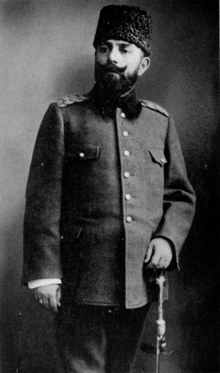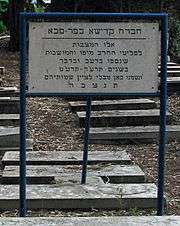Tel Aviv and Jaffa deportation
The Tel Aviv and Jaffa deportation was the forcible deportation of the entire civilian populations of Jaffa and Tel Aviv on April 6, 1917, by the Ottoman Empire's authorities in Palestine.[1]


While the deportation order referred to the entire population, Jews and Muslims alike, the Muslims were allowed to return to their homes shortly thereafter, but the Jews affected by the deportation were unable to return to their homes until the British conquest, in summer 1918. An estimated 1,500 of the deported Jews died during the harsh 1917-8 winter, mostly of hunger and disease.[2]
Background
In November 1914, the Ottoman Empire entered World War I on the side of the Central Powers. Many people from the opposing Allied countries lived in Palestine, and its Turkish officials considered them a threat to military security. Two waves of expulsion occurred as part of Turkish failed defence of their fading empire.
In December 1914, the Turks expelled up to 6,000 Jews who resided in Jaffa.[3] They were resettled in Alexandria, Egypt.[4]
By January 1917, British forces had crossed the Sinai Desert and were about to invade Palestine, which alarmed the Turkish authorities.
Deportation
On April 6, 1917 Djemal Pasha, the military governor of Ottoman Syria, ordered a mass deportation of all inhabitants from Tel Aviv and Jaffa.[2] The order came on the eve of Passover,[5] and there was harsh criticism in newspapers in Europe and Germany, Turkey's wartime ally, of the Turkish Army's treatment of Palestine's civilians and reports of a massacre against Tel Aviv's Jews. Djemal Pasha, who was in charge of the Greater Syrian Theatre of the war, was forced to provide explanations.[6]
While the Muslim evacuees were allowed to return soon afterward, the Jewish evacuees were not allowed to return until after the British conquest, in the summer of 1918.[7][2]
The Jews of Jaffa and Tel Aviv organized a migration committee, headed by Meir Dizengoff and Rabbi Menachem Itzhak Kelioner. The committee arranged the transportation of the Jewish deportees to safety, with the assistance of Jews from the Galilee, who arrived in Tel Aviv with carts. The exiles were driven to Jerusalem, to cities in central Palestine (such as Petah Tikva and Kfar Saba) and to the north of Palestine, where they were scattered among the different Jewish settlements in the Lower Galilee, in Zichron Yaacov, Tiberias, and Safed. Up to 16,000 deportees were evacuated from Tel Aviv, which was left with almost no residents.
The homes and property of the Jews of Jaffa and Tel Aviv were kept in the possession of the Ottoman authorities, and they were guarded by a handful of Jewish guards. Djemal Pasha also released two Jewish doctors to join the deportees. Nonetheless, many deportees perished during the harsh winter of 1917–1918 from hunger and contagious diseases: 224 deportees are buried in Kfar Saba, 15 in Haifa, 321 in Tiberias, 104 in Safed, and 75 in Damascus.[8]
References
- When Tel Aviv was a wilderness, Haaretz
- Genocide: The Basics, Paul R. Bartrop, page 36
- Mary McCune (July 2005). The Whole Wide World, Without Limits: International relief, gender politics, and American Jewish women, 1893-1930. Wayne State University Press. p. 46. ISBN 978-0-8143-3229-0. Retrieved November 26, 2010.
- Jonathan R. Adelman (2008). The Rise of Israel: A history of a revolutionary state. Routledge. pp. 58–59. ISBN 978-0-415-77510-6. Retrieved November 26, 2010.
- This Day in Jewish History 1917: Ottoman Authority Orders Jews to Evacuate Tel Aviv, Ha'aretz, David B. Green, 6 April 2014
- Hasson, Nir. "The 1917 Expulsion of Tel Aviv's Jews, Seen Through Turkish Eyes". Haaretz. Retrieved December 25, 2016. (subscription required)
- Friedman, Isaiah (1971). German Intervention on Behalf of the "Yishuv", 1917 , Jewish Social Studies, Vol. 33, pp. 23–43.
- Nadav Shragai (September 12, 2007). מדוע לא מנציחה עיריית תל אביב את נספי גירוש 1917? [Why doesn't the municipality commemorate the deportation victims of 1917?]. Haaretz (in Hebrew). Retrieved August 14, 2014.
External links
- Tom Segev (October 5, 2009). "When Tel Aviv was a wilderness". Haaretz. Retrieved August 14, 2014.
- Tel Aviv and Jaffa deportation on the Tel Aviv municipality website (in Hebrew)